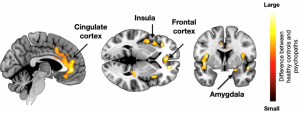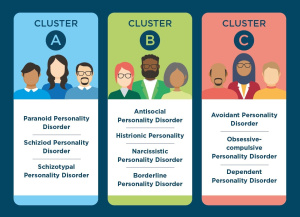The Neurological Impact on Psychopathy
Psychopathy, or now more commonly known as antisocial personality disorder, in the simplest definition is the neuropsychiatric disorder that is commonly associated with deficient emotional responses, lack of empathy, aggression, manipulativeness, and lacking behavioral controls. This definition makes it clear that there must be some difference in the brains and/or genes of those with this disorder. Gene expression specifically has recently been linked to those with ASPD compared to those without. Genes that have been found in people with ASPD- RPL109, ZNF132, CDH5, and OPRD1 genes-have also been linked to genes found in those with autism. Similarly, there was findings that psychopathy is normally passed down from the father to son, possibly because of the XY genes of males compared to the XX gene in females. PEG10 is one paternally imprinted gene that was connected to the passing down of ASPD. Furthermore, another neurological change in those with psychopathic behaviors is related to dopamine release. Dopamine released from the cerebellum also has regulatory functions in social behavior. There is a connection between the cerebellum and antisocial behavior along with immune response-related pathways enrichment in those that express psychopathic behavior (1).

Diagnosis of ASPD
The overall consensus on how many people in the United States have ASPD is 1-4%. However, how does one determine this serious diagnosis? First, there are other antisocial disorders that have similar symptoms to ASPD. Borderline personality disorder includes unstable moods or manipulating behaviors, both overlapping with ASPD. Narcissistic personality disorder is diagnosed by looking for inflated sense of self-importance, which is also similar to those with ASPD. The only way to correctly differentiate between ASPD and other personality disorders is through behavior analysis by a psychiatrist or psychologist. People can begin developing ASPD traits in their early teen years or late childhood. This age makes diagnosis difficult because it can also be mistaken for ADHD, depression, or oppositional defiant disorder. Specific behavioral symptoms that a professional may look for during diagnosis is physical aggressiveness, reckless behaviors, blaming others, breaking the law, etc (2).

Is there a cure?
There is no cure. There is medication and therapy that may help the person control the effects of the disorder; however, there is no way to completely cure a person from ASPD. Therapy can include cognitive behavioral therapy that focuses on changing one’s thinking and behavior. Therapy can also include group therapy or family therapy. Family therapy could be important for the people that live with someone who has ASPD. ASPD does not just affect the person with the disorder, but also people around them, which is why it is so important to understand what the disorder entails. The stigma around having the disorder might negatively influence if people want to recognize it within themselves or want to get help (3).
Conclusion
Antisocial personality disorder has not been studied enough to where we have many long-term treatment options. However, new research is finding the links between this disorder and genes or neurotransmitter releases. Understanding brain chemistry is important in understanding what exactly causes such a behavior and possibly find more ways to diagnose the disorder.
Citations:
- Tiihonen, J., Koskuvi, M., Lähteenvuo, M., Virtanen, P. L. J., Ojansuu, I., Vaurio, O., Gao, Y., Hyötyläinen, I., Puttonen, K. A., Repo-Tiihonen, E., Paunio, T., Rautiainen, M.-R., Tyni, S., Koistinaho, J., & Lehtonen, Š. (2019). Neurobiological roots of psychopathy. Molecular Psychiatry, 25(12), 3432–3441. https://doi.org/10.1038/s41380-019-0488-z
- Antisocial personality disorder: Causes, symptoms & treatment. (n.d.). Cleveland Clinic. Retrieved April 5, 2023, from https://my.clevelandclinic.org/health/diseases/9657-antisocial-personality-disorder
- Antisocial personality disorder – Diagnosis and treatment. (2023, February 24). Mayo Clinic. https://www.mayoclinic.org/diseases-conditions/antisocial-personality-disorder/diagnosis-treatment/drc-20353934
- Types of personality disorders. (2018, November 12). Priory. https://www.priorygroup.com/mental-health/personality-disorder-treatment/types-symptoms-of-personality-disorders
- News, N. (2021, April 14). The neural basis of psychopathy. Neuroscience News. https://neurosciencenews.com/psychopahty-neural-basis-18234/
